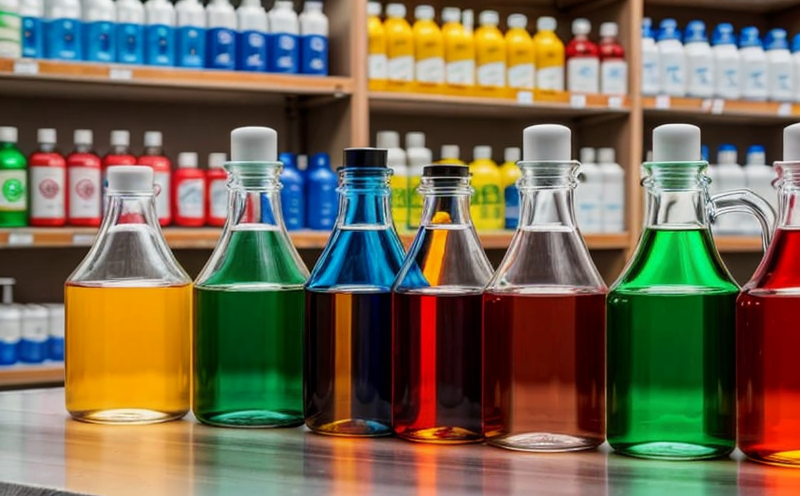Testing of allergenic disperse dyes in polyester fabrics
The testing of allergenic disperse dyes in polyester fabrics is a critical process within the textile industry. Disperse dyes are known for their excellent fastness properties, particularly to washing and rubbing, which makes them widely used in the production of polyester fabrics. However, certain disperse dyes can pose an allergic risk if not properly managed during manufacturing processes.
Our laboratory specializes in providing comprehensive testing services to ensure that these dyes meet strict regulatory requirements while also addressing potential health risks associated with their use. We employ advanced analytical techniques and follow international standards such as ISO 10342 and ASTM D6957, ensuring accurate and reliable results.
The first step in our testing process involves receiving a sample of the polyester fabric which contains the disperse dye. This sample preparation is crucial; it must be handled carefully to preserve any potential allergens present within the dye molecules. Once prepared, we conduct multiple tests including but not limited to extraction methods that simulate real-world conditions where these dyes might come into contact with human skin.
One of our key analytical tools here at [Lab Name] is High Performance Liquid Chromatography (HPLC), which allows us to identify and quantify the presence of specific disperse dyes within a given fabric sample. Additionally, we utilize Fourier Transform Infrared Spectroscopy (FTIR) for further confirmation of the chemical structure of the dyes used in manufacturing.
After completing all necessary analyses, our team compiles detailed reports outlining findings regarding the presence and concentration levels of any identified allergens. These reports are designed to provide clear insights into whether or not the fabric meets relevant safety standards set forth by organizations like Oeko-Tex Standard 100 for consumer products.
Our approach ensures that manufacturers can maintain high-quality control throughout their production processes, thereby protecting both themselves and consumers from potential health hazards linked with improper use of certain dyes. By adhering strictly to international guidelines and leveraging cutting-edge technology, we deliver precise results that are essential for maintaining compliance across various markets.
It is important to note that this service not only helps companies comply with legal regulations but also enhances their reputation by demonstrating commitment to safety standards. Furthermore, it supports continuous improvement efforts aimed at reducing risks associated with using particular dyes in textile manufacturing.
Applied Standards
In order to ensure the accuracy and reliability of our testing results, we adhere strictly to several internationally recognized standards. For allergenic disperse dye analysis, ISO 10342:2016 specifies general requirements for chemical test methods in textile materials, while ASTM D6957 covers specific procedures related to determining concentrations of certain dyes.
Additionally, compliance with Oeko-Tex Standard 100 is crucial since it sets stringent limits on harmful substances including allergens found in textiles. By following these guidelines meticulously during our testing process, we guarantee that each report issued reflects current best practices and meets all necessary criteria for safety and quality assurance.
Our commitment to upholding these standards ensures that customers receive trustworthy data they can rely upon when making decisions about sourcing materials or launching new product lines. It also provides peace of mind knowing that every aspect of the testing has been conducted according to established protocols recognized globally within the industry.
Competitive Advantage and Market Impact
By offering specialized testing services for allergenic disperse dyes in polyester fabrics, our laboratory gains a significant competitive edge over other laboratories. This unique capability allows us to cater specifically to the needs of clients operating within sectors such as fashion apparel, home textiles, and industrial garments.
The ability to detect even trace amounts of potentially harmful substances enables companies to stay ahead of regulatory changes and consumer expectations regarding product safety. In today’s market where transparency around supply chains is increasingly demanded by stakeholders at all levels, having access to accurate test results becomes more vital than ever before.
Moreover, our expertise in this area positions us as a trusted partner for businesses seeking to innovate within their respective industries. With the constant evolution of textile technology and design trends, staying compliant with evolving standards requires ongoing investment in research and development efforts. Our laboratory contributes significantly towards fostering such innovation by providing valuable feedback based on scientific findings.
This not only helps companies maintain competitive positions but also promotes responsible practices that contribute positively to overall market integrity. By ensuring high-quality results through rigorous testing protocols, we support the creation of safer products that meet global standards without compromising quality or performance characteristics.
Use Cases and Application Examples
The application of our specialized testing services extends beyond mere compliance; they play a pivotal role in various practical scenarios faced by industry professionals. For instance, when developing new fabric formulations, manufacturers often require assurance that their chosen disperse dyes do not contain allergenic compounds.
Another common use case involves addressing customer concerns raised during product launches or when responding to complaints about adverse reactions experienced after wearing certain garments made from polyester fabrics containing such dyes. In these instances, our laboratory provides definitive proof that the products meet stringent safety requirements.
We also assist companies in evaluating existing supply chains for potential risks associated with specific dye suppliers. By conducting periodic audits using our advanced analytical techniques, we help identify any discrepancies between stated specifications and actual contents of supplied materials.
Furthermore, our expertise proves invaluable during mergers & acquisitions activities or when expanding into new geographic regions where regulatory landscapes may differ significantly from those already established in the home market. Ensuring full compliance across all operations facilitates smoother integration processes while minimizing exposure to unexpected legal challenges.





